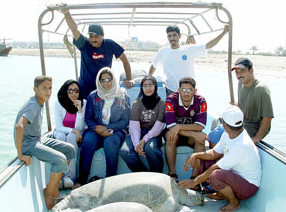By Meera Ravi
The worst-hit victims of the lifting of the ban on shrimping have been
Bahrain turtles, according to environmental activist Khawla Al Muhannadi,
leading a campaign to raise awareness on the plight of the endangered
sea creature. “Environmental Friends Society (EFS) launched an
initiative last year to bring together concerned bodies to aid turtles,
and we have found that the green turtle, which is the most numerous of
the three commonly found varieties in Bahraini waters, are most at risk.
“On Friday, when our Environmental Alliance for the Protection of Fasht Al Adhem (EAPFA) went on a recce of prawn grounds in the northern area of Bahrain, we recorded eight dead turtles with almost all of them badly injured after getting entangled in shrimping nets and being bludgeoned, trussed and thrown into the sea by fishermen unaware of the biological and environmental value of the turtle.
“Of course, we also found three small live specimens but we are concerned that fishermen are unaware of the need to stop using illegal fishing equipment which harms the marine environment.” The campaign was spurred by the discovery of a giant 100kg dead turtle in Samaheej last week with the mission on Friday also recording yet another 100-kilo specimen as well as another smaller one weighing in at about 40kg.
The group says Bahraini prawn fishermen use wide nets in their fishing which catch all marine life along with the shrimp. Moreover, the nets are often made of nylon, making it difficult for larger creatures to break free of them as nylon rope cuts fins and injures creatures as they struggle to get free.
There will be even more instances of dead turtles in the prawn grounds to the south of the Kingdom where more fishermen work, said Khawla. “We are following a three-pronged approach to the problem,” she explained. “First, we want to collect data on the turtles and create a proper database on which to build our future action plans.

“Secondly, we want to educate fishermen on the value of respecting turtles and other sea-life as part of the larger marine environment that will, in turn, enrich them by providing better fishing grounds. This educational awareness campaign will also monitor their use of banned equipment such as nylon nets and abandoned gargour traps, clustered gargour traps that will increase the risk of drifting ghost traps that serve only to trap and kill fish since the fishermen will never retrieve them and teach them that it is counter-productive to use larger and wider shrimping nets since these catch other sea-life that they have no use for but which can serve the marine environment.
“Thirdly, we intend to use our database and findings to push for stricter fishing laws and the tightening of licencing procedures so that there is no over-fishing with laws governing the use of specific equipment and methods more eco-friendly.” The group is being assisted by the National Society for Marine Hobbies and the Fishermen’s Union. “Not all fishermen are unaware of the rules governing the marine environment.
“Many do help us by reporting unusual phenomena or deaths of sea-creatures and do use environmentally safe fishing techniques,” Khawla said. “The Bahraini turtle species – there are three in all: the green, the hawksbill and loggerhead turtles – are indigenous to the Gulf, and because of loss of their habitat to growing urbanisation in the Gulf countries, land reclamation and loss of sea-grass feeding grounds, their numbers are being reduced.”
She appealed for volunteers and help from organizations to make it possible to conduct data-collection trips to sea and said EAPFA was expecially grateful to director of fisheries and marine resources Jassim Al Qasseer for his support. The coast guard and the Public Commission for the Protection of Marine Resources, Environment and Wildlife are backing alliance efforts, and she has appealed to recreational fishermen and members of the public to alert the alliance if they saw any turtle in difficulty or dead along the Bahrain coast or at sea so the team could add information to their data. The contact number is that of member Hussain Al Oraibi (3953 5678).